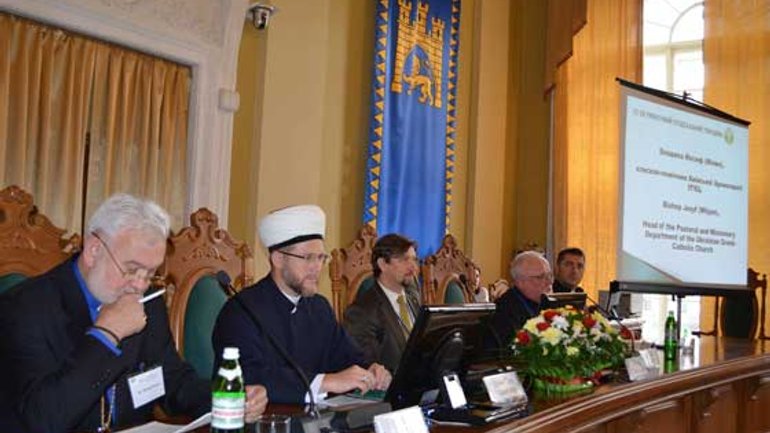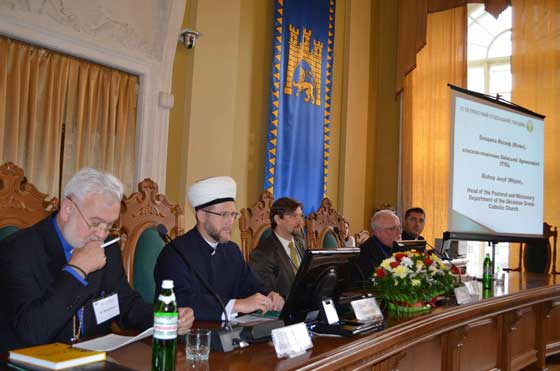Ecumenical Social Week in Lviv: Church cannot remain indifferent to problems of IDPs

Pastoral care of the UGCC of IDPs, charitable projects of "Caritas," social ministry of the church, the situation of the Crimean Tatar population after moving from the occupied Crimea and the spiritual ministry of Muslims are the issues that were discussed by the participants of the round table themed “Role of the church in addressing problems of IDPs,” held on September 28 IX under the Ecumenical social week.
Among the participants were social workers, representatives of different religions, scientists and priests of various denominations. Speakers of the event: Bishop Joseph (Milian), auxiliary bishop of the UGCC Archdiocese of Kyiv, Sheikh Said Ismagilov,Mufti of the Religious Administration of Muslims of Ukraine “Ummah,”GrigorySeleshchuk, Caritas-Ukraine project coordinator for assistance to IDPs. Moderator of the round table wasDr. Ivan Dacko, president of the Institute of Ecumenical Studies at the Ukrainian Catholic University.

“Be hospitable to newcomers without insulting accusations of separatism”
Bishop Joseph Milian outlined the strategy of pastoral and social work of the UGCC with the displaced and victims of war. According to him, the Church faces two important challenges - to teach people to be hospitable to newcomers without prejudice and coordinate social work of the Church.
"Modern society resolves the problemsby means of force. And how can modern pedagogy offer future generations the ability to gain the world through compassion? Even our Christian position often intends to gain the kingdom of God through spiritual practice. The young man who came to Christ, was certain that has had everything done obeying the commandments from childhood, he was able to understand the kingdom of God. What is the opportunity God gives to Ukraine today? Get someone's heart, feed the poor, give drink to the thirsty, take home a traveler. In the words of Christ, 'I desire mercy, not sacrifice,” said the Bishop.
He urged the faithful Church and all Christians of good will continue uninterrupted fasting and prayer for peace in Ukraine. By decision of the Kyiv Archdiocese of the UGCC, on Mondays, 5 regions Central Ukraine maintain strict fasting and pray for refugees, internally displaced persons and victims of war.
One of the major achievements in global terms is the “Pope for Ukraine” action during which the pontiff announced fundraising for Ukraine among Catholics in Europe. “Most importantly, the Holy Father broke the silence in Europe. It was the voice of those who suffer in Ukraine. Speaking about the humanitarian crisis, he appealed to the conscience of European Catholics and stressed that Ukrainian are also Catholics,” the Bishop said.
“The Church must give voice to those who does not have it. In Western Ukraine sometimes it is the case that as a result of war the people extraject their anxiety, confusion, fear and distress, pain to IDPS accusing them of separatism. The Church has to explain to local people the necessity of more welcoming attitude to IDPs. It is not enough to speak only about human values, solidarity and hospitality. We must focus on purely religious approach of Scripture regarding hospitality to IDPs,” said the bishop.
The UGCC efforts to expand social service and outside Ukraine, said Bishop Joseph. As head of the Pastoral Missionary Department, he noted that Ukrainians reside in 45 countries while in only 18 they are provided pastoral care.
“The hidden nature of division between people is one of the dangers in frontline areas of Donbass”
Thanks to the charitable activity of Caritasfrom May 2014, about 220,000 people received assistance. The organization operates in 19 regions of Ukraine, mainly western and eastern ones. Caritas-Ukraine project coordinator for assistance to IDPs Gregory Seleshchukhighlighted the critical issue of reconciliation between IDPs and local people on the example of Kramatorsk.
"The breakup between people is not territorial. In fact, the breakup line is in each of us. We can choose whether to accept or remain enemies. This is a fundamental question. Each of us can contribute to the cause of reconciliation and integration. You must be able to see human in a person,” he said.
In Kramatorsk, Caritas conducted a study on the causes of social conflict. Mostly this is social instability, compounded by increasing population due to the integration of IDPs and differences in values, the project coordinatorsaid. This is especially seen in the buffer zones, where, according to him, people are divided in 4 groups - pro-Ukrainian locals, pro-Russian locals, pro-Ukrainian IDPs and pro-Russian IDPs.
"The breakup line between values liesis not the line between hostsandIDPs and the line of pro-Ukrainian and pro-Russian members of the community. These subgroups are among IDPs and among hosts. The pro-Ukrainian locals andIDPs will reconcile much faster than the pro-Russian and pro-Ukrainian members of community. The conflict gain depends on how much time we will invest in reconciliation. Social dialogue towards reconciliation is one of the priorities of Caritas, said GrigorySeleshchuk.
He analyzed four groups of Kramatorskaby the main strategies of social behavior in situations of conflict, competition, compromise, adjustment, evasion from solving the problem (avoidant behavior) and cooperation through joint efforts.
“Both among the pro-Ukrainians and among pro-Russians the prevailing strategy is compromise. It is expressed in the focus group discussions when opponents admit that they try not to speak on political issues. The strategy of adjustment is selected by pro-Russian members of the community, both among the newcomersand the old-timers. In Kramatorsk they just keep silent, without expressing their position. The strategy of avoiding conflict is adopted by pro-Ukrainian Kramatorsk residents, while the strategy of rivalry is not, perhaps because the rivalry is already evident on the front lines,”GrigorySeleshchuk says.
In his opinion, one of the dangers in the frontline areas of Donbass is that the separation between people is hidden while dissent is growing from inside.
The coordinator of Caritas-Ukraine stresses that IDPs and local people need together to adapt to the new reality: “War has changed Ukraine. The large influx of IDPs has changed our city. For me, the best way to get accustomed to it is to pay attention to those in need. It can be both displaced and local residents. Do not make the difference between them.”
“The most important thing in addressing the problems ofIDPsis to prevent them closing in a ghetto”
In Ukraine there are over 1 million Muslims, 400 thousand of which are indigenous Muslims of Crimea. More than 90% are representatives of the Crimean Tatar population that survived deportation in the Soviet Union. During the occupation of the peninsula by Russia at the beginning of 2016, 20 thousand Crimean Tatars remained. Sheikh Said Ismagilov, Mufti of the Religious Administration of Muslims of Ukraine “Ummah,” shared this statistical data with the roundtable participants.
According to him, the Muslim population includes three groups of IDPs: those from Crimea,from Donbas and from the Middle East. The Muslims of Crimea also include, apart from the Crimean Tatars, the community of Turks, Azeris, Arabs who are IDPs to Ukraine. Some of the IDPs settled in Crimea, Kherson region and got engaged in agriculture, some of the most educated moved to Kyiv and Lviv. Those who could not travel to the EU and failed to settle in cities, returned to Crimea. There is small Muslim community in Odesa, Zaporizhzhya, Dnipropetrovsk and Donetsk regions.
Sheikh Said Ismagilov comes from Donetsk. During the war in Donbass about 3 thousand Muslims were displaced. According to the Mufti, among those who left Ukraine were Turkish Ossetians that during the fighting for Slovyansk appealed to Turkey to grant them asylum.
“In Ukraine, the Muslim religious establishment is primarily engaged in spiritual service and legal assistance, launching cultural and educational programs. Muslims try to preserve their identity and their faith primarily through opening religious cultural centers, libraries, studios for women. Muslim tradition allows using adapted rooms for ceremonies and national holidays,” the sheikh said.
He believes that IDPs of Islamic religion does not need to rush to the construction of mosques, especially in Galicia: “A mosque is a religious building that in this Christian region as Galicia will be hardly accepted, because we have not integrated into the new environment. I always remind Crimean Tatars that time comes, and perhaps they will return to their homeland in Crimea.”
Instead, Mufti considers the urgent need to allocate space for the cemetery. Lviv allocated to Muslims a separate area at the cemetery, while in Kyiv this question is very hard to get moving, Said Ismagilovsaid.
The most important thing in dealing with IDPs is to prevent them from closing in a ghetto. In fact, after moving to other regions some of them are closing within their communities and get suspicious of others. As he explains in an atmosphere of tension, inspired by Russia, the Crimean Tatars have the impression that they have to fight for their place in the Crimean Peninsula because the pro-Russian population perceives them as enemies.
“I urge everyone after moving to other regions not perceive others as enemies and strangers, as in Crimea. The Quran says that Christians are the closest to Muslims, and there are more common things than differences. Overall, our Muslims are well integrated into the environment of other cities. Among us there are those who went to serve in the ATO,” the mufti said.
He thanked for the support to Ukrainians and Muslims of Germany and Turkey who have provided financial assistance to their counterparts from Ukraine.
“Let us help one another in faith and good deeds and not help one another in unbelief and crime. If we are the one body, when one is aggrieved all the rest come to the rescue,” he reminded.









